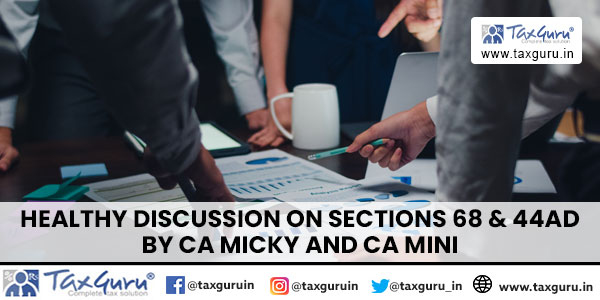Understanding the intricacies of the Income Tax Act is crucial for taxpayers and professionals alike. Sections 68 and 44AD, in particular, play significant roles in tax compliance and financial management for small businesses. In this discussion, CA Micky and CA Mini delve into the details of these sections, offering clarity and practical insights.
Q: Can you explain what Section 68 of the Income Tax Act is all about?
A: Absolutely, Mini. Section 68 deals with unexplained cash credit and as per this section if any sum is found credited in books of assessee for any previous year & assessee fails in providing satisfactory explanation for the nature along with source of the same, it may be treated as taxable income.
Here is exact wording of section Section 68: “Where any sum is found credited in the books of an assessee maintained for any previous year, and the assessee offers no explanation about the nature and source thereof or the explanation offered by him is not, in the opinion of the Assessing Officer, satisfactory, the sum so credited may be charged to income-tax as the income of the assessee of that previous year.”
Q: So, if there’s unexplained money, it can be taxed. How does Section 44AD fit into this?
A: Section 44AD is special provision for small businesses with a turnover of up to ₹2 Cr. Under this section, businesses can declare 8% or 6% for digital transactions of their gross receipts as income & specifically are not required to maintain detailed books of accounts. Here’s what the section says:
Section 44AD(1) : “Notwithstanding anything to the contrary contained in sections 28 to 43C, in the case of an eligible assessee engaged in an eligible business, a sum equal to eight percent of the total turnover or gross receipts of the assessee in the previous year on account of such business or, as the case may be, a sum higher than the aforesaid sum claimed to have been earned by the assessee, shall be deemed to be the profits and gains of such business chargeable to tax under the head ‘Profits and gains of business or profession.’”

Q: If businesses don’t need to keep detailed books u/s. 44AD, how can Section 68 be applied?
A: That’s the tricky part. Section 68 requires existence of books to trace unexplained credits. But if there is no book of accounts as allowed u/s. 44AD, applying Section 68 becomes challenging.
Q: Can you give me some examples of how courts have dealt with this issue?
A: Sure, Let’s start with a case where this was discussed:
- Madhu Raitani v. Asstt. CIT: In this case, the court observed that since no books were maintained as per the provisions of Section 44AD, Section 68 could not be applied.
The court emphasized that existence of books is a prerequisite for invoking Section 68.
- Danveer Singh S/o Bhagal Singh v. ITO: Tribunal ruled that if an assessee doesn’t maintain books of accounts, no addition can be made u/s. 68. A bank passbook was deemed insufficient to qualify as books of accounts.
Q: What if there are significant financial transactions that aren’t explained?
A: Good question, Here is another case that addresses this concern:
- Arunkumar J. Muchhala v. CIT: Here, Court held that even if an assessee doesn’t maintain books, they can’t take undue advantage. If there’s substantial unexplained cash credit, it needs to be justified. The court emphasized that business operators must keep proper records, even if they aren’t detailed.
Q: So the courts are ensuring people don’t misuse these provisions, right?
A: Courts aim to simplify compliance for small businesses while preventing misuse. For instance, in Dineshkumar Verma v. ITO, the court ruled that bank statements alone couldn’t be used to invoke Section 68 without additional proof.
Q: Can bank statements be used as evidence for unexplained credits?
A: Not really, as explained in this case :
Syed Maqsoodulla v. ITO: in that, court clarified that bank statements aren’t considered books of accounts. They cannot serve as a basis for invoking Section 68 without corroborative evidence.
Q: What challenges do Assessing Officers face in such cases?
A: There are challenges, especially when officers demand details beyond what’s required by Section 44AD. Here’s a case illustrating this:
- Sumit Gahlot v. ITO: Here, Ld. AO has asked for details of sundry creditors & debtors However, assessee opted for presumptive taxation u/s. 44AD, maintaining such records was not required as per law . Tribunal found no merit in the officer’s demands, ensuring businesses aren’t burdened with unnecessary compliance.
Q: Are there any safeguards against the misuse of these provisions?
A: Yes, there are safeguards. Tax authorities can investigate discrepancies using other sections as like Section 69 for unexplained investments if foul play is suspected. The goal is to ensure taxpayers genuinely adhere to Section 44AD without bypassing proper disclosures.
Thanks, Micky! This really helps me understand how these sections work together. It seems like a balance between simplifying tax processes and preventing abuse.
You’re welcome, Mini! That’s exactly it. The law aims to make things easier for small businesses while ensuring fairness and compliance. It’s all about understanding the principles behind these rules.
Certainly! Here’s a concluding paragraph that emphasizes the educational nature of the Q&A session:
This Q & A session between CA Micky and CA Mini is designed to provide a basic understanding of the provisions of Sections 68 and 44AD of IT Act, 1961. It highlights key aspects of these sections, supported by relevant case law which can help readers grasp how they are applied in practice. This discussion aims to clarify the statutory provisions and their implications but should not be taken as professional advice or legal opinion. We have not sited citation as it was discussion format , if any one needed than can contact at +91 8000777854,





